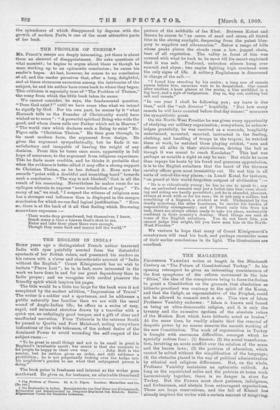THE ENGLISH IN INDIA.f
'SOME years ago a distinguished French author traversed India with eyes painfully averted from the distasteful spectacle of her British rulers, and presented his readers on his return with a &Aver and characteristic account of " India -without the English." Count Konigsmarck has no wish to imitate "Pierre Loti "; he is, in fact, more interested in the -work we have done in and for our great dependency than in
India proper; and we recognise with cordial pleasure the friendly spirit which inspires his pages.
The title would be a little too large for the book were it not completed by the modest addition, "Impressions of Travel." The writer is a soldier and a sportsman, and he addresses a public naturally less familiar than we are with the usual round of Anglo-Indian life; be offers us a series of easy, vapid, and animated sketches drawn by a traveller with a
-quick eye, an unfailingly good temper, and a gift of clear and ',unaffected narration. From Tuticorin in the extreme South 'be passed to Quetta and Fort Malakand, noting everywhere indications of the wide tolerance, of the ardent desire of the
dominant Power to avoid wounding the self-respect of the subject-races :-
" To be groat in small things and not to be small in great is England's invaluable merit ; her secret is that she consents to let people be happy in their own way John Bull is the waster, but he seldom gives an order, and still seldomer a prohibition ; he is not perpetually looking over the hedge into his neighbour's garden to see what that subjugated person is doing."
The book gains in freshness and interest as the writer goes northward. He gives us, for instance, an admirable thumbnail
* The Problem of Theism. By A. C. Pigou. London : Macmillan aud Co. :[88. net.]
Die Englaender in Indies. Reimmindriicke von Orel Hans von Kilnigemarck, Bittineister and Eekadronchof iw Wagoner-Regiment von Bredow. Berlin : 11.1gemoiner Veroin fUr Deutsche Literatur.
picture of the saltfields of Isa Khel. Between Kohat and Bannu he comes to "an ocean of sand and stone, all tinted blue in the strong sunlight, deepening from the palest blue- grey to sapphire and ultramarine." Below a range of hills whose peaks pierce the clouds runs a low, jagged chain, bare of all vegetation. The valley in front of him was covered with what he took to be snow till his escort explained that it was salt. Profound, unbroken silence hung over
summit and abyss ; two eagles fighting high overhead were the only signs of life. A solitary Englishman is discovered in charge of the salt :— "I found him standing by his scales ; a long row of camels passes before him, caravans wait to be despatched. One camel after another, a keen glance at the scales, a line scribbled in a big book, and a sigh of resignation. Day in, day out, nothing but salt and camels."
"In one year I shall be following you ; my leave is due then," said the "salt director" hopefully. "But how many camels he will have counted before that day comes !" murmurs the sympathetic guest.
On the North-West Frontier he was given every opportunity of studying our military organisation; everywhere, be acknow- ledges gratefully, he was received as a comrade, hospitably entertained, mounted, escorted, instructed in the feeding, clothing, and handling of troops in the tropics; be watched them at work, he watched them playing cricket, "men and officers all alike in their shirt-sleeves, driving the ball as
though it was meant to reach Kandahar," This last was perhaps as notable a sight as any he saw. But while he more
than repays his hosts by his frank and generous appreciation, it is to the English subaltern that the heart of the German cavalry officer goes most irresistibly out. He met him in all sorts of out-of-the-way places,—in Lundi Kotal, for instance, "on guard at this world-forgotten outpost of civilisation "
" He is so ridiculously young ; he has no one to speak to ; any day an ambushed assassin may put a bullet into him ; oven shoot- ing and riding are hardly permitted ; yet ho is cheerful, pleasant, always at work with or for his mon; he is not only a soldier, but something of a linguist, a student as well. Undaunted by the deadly monotony, the utter loneliness, he carries his burden of responsibility courageously ; and if Death calls him from his task, there are always others ready to take his place, unshakably confident in their country's destiny. Hard things are said at home of the English subaltern. You do not know him, you cannot judge him aright, till you have seen him on the North- West Frontier."
We venture to hope that many of Count Ktinigsmarck's countrymen will read his book, and perhaps reconsider some of their earlier conclusions in its light. The illustrations are excellent.














































 Previous page
Previous page